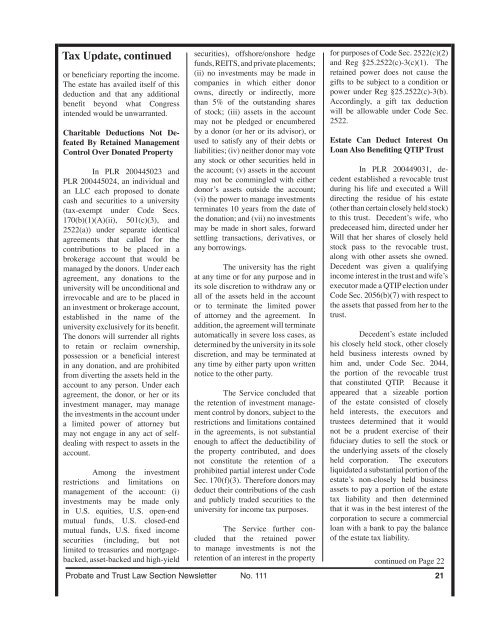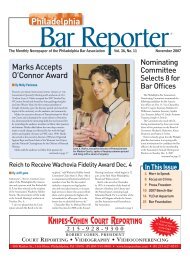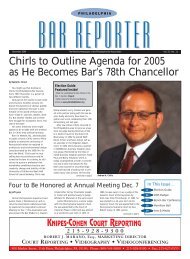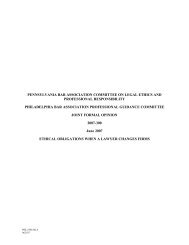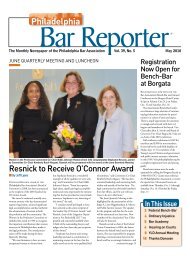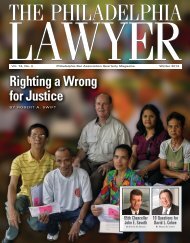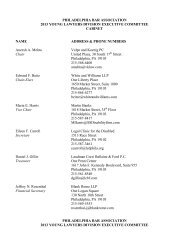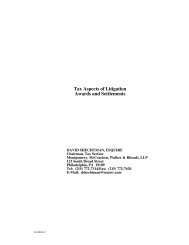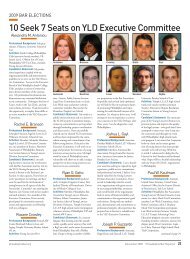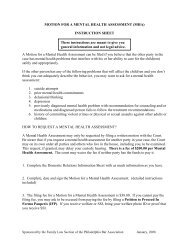Probate & Trust Newsletter: April 2005 - Philadelphia Bar Association
Probate & Trust Newsletter: April 2005 - Philadelphia Bar Association
Probate & Trust Newsletter: April 2005 - Philadelphia Bar Association
You also want an ePaper? Increase the reach of your titles
YUMPU automatically turns print PDFs into web optimized ePapers that Google loves.
Tax Update, continued<br />
or beneficiary reporting the income.<br />
The estate has availed itself of this<br />
deduction and that any additional<br />
benefit beyond what Congress<br />
intended would be unwarranted.<br />
Charitable Deductions Not Defeated<br />
By Retained Management<br />
Control Over Donated Property<br />
In PLR 200445023 and<br />
PLR 200445024, an individual and<br />
an LLC each proposed to donate<br />
cash and securities to a university<br />
(tax-exempt under Code Secs.<br />
170(b)(1)(A)(ii), 501(c)(3), and<br />
2522(a)) under separate identical<br />
agreements that called for the<br />
contributions to be placed in a<br />
brokerage account that would be<br />
managed by the donors. Under each<br />
agreement, any donations to the<br />
university will be unconditional and<br />
irrevocable and are to be placed in<br />
an investment or brokerage account,<br />
established in the name of the<br />
university exclusively for its benefit.<br />
The donors will surrender all rights<br />
to retain or reclaim ownership,<br />
possession or a beneficial interest<br />
in any donation, and are prohibited<br />
from diverting the assets held in the<br />
account to any person. Under each<br />
agreement, the donor, or her or its<br />
investment manager, may manage<br />
the investments in the account under<br />
a limited power of attorney but<br />
may not engage in any act of selfdealing<br />
with respect to assets in the<br />
account.<br />
Among the investment<br />
restrictions and limitations on<br />
management of the account: (i)<br />
investments may be made only<br />
in U.S. equities, U.S. open-end<br />
mutual funds, U.S. closed-end<br />
mutual funds, U.S. fixed income<br />
securities (including, but not<br />
limited to treasuries and mortgagebacked,<br />
asset-backed and high-yield<br />
securities), offshore/onshore hedge<br />
funds, REITS, and private placements;<br />
(ii) no investments may be made in<br />
companies in which either donor<br />
owns, directly or indirectly, more<br />
than 5% of the outstanding shares<br />
of stock; (iii) assets in the account<br />
may not be pledged or encumbered<br />
by a donor (or her or its advisor), or<br />
used to satisfy any of their debts or<br />
liabilities; (iv) neither donor may vote<br />
any stock or other securities held in<br />
the account; (v) assets in the account<br />
may not be commingled with either<br />
donorʼs assets outside the account;<br />
(vi) the power to manage investments<br />
terminates 10 years from the date of<br />
the donation; and (vii) no investments<br />
may be made in short sales, forward<br />
settling transactions, derivatives, or<br />
any borrowings.<br />
The university has the right<br />
at any time or for any purpose and in<br />
its sole discretion to withdraw any or<br />
all of the assets held in the account<br />
or to terminate the limited power<br />
of attorney and the agreement. In<br />
addition, the agreement will terminate<br />
automatically in severe loss cases, as<br />
determined by the university in its sole<br />
discretion, and may be terminated at<br />
any time by either party upon written<br />
notice to the other party.<br />
The Service concluded that<br />
the retention of investment management<br />
control by donors, subject to the<br />
restrictions and limitations contained<br />
in the agreements, is not substantial<br />
enough to affect the deductibility of<br />
the property contributed, and does<br />
not constitute the retention of a<br />
prohibited partial interest under Code<br />
Sec. 170(f)(3). Therefore donors may<br />
deduct their contributions of the cash<br />
and publicly traded securities to the<br />
university for income tax purposes.<br />
The Service further concluded<br />
that the retained power<br />
to manage investments is not the<br />
retention of an interest in the property<br />
for purposes of Code Sec. 2522(c)(2)<br />
and Reg §25.2522(c)-3(c)(1). The<br />
retained power does not cause the<br />
gifts to be subject to a condition or<br />
power under Reg §25.2522(c)-3(b).<br />
Accordingly, a gift tax deduction<br />
will be allowable under Code Sec.<br />
2522.<br />
Estate Can Deduct Interest On<br />
Loan Also Benefiting QTIP <strong>Trust</strong><br />
In PLR 200449031, decedent<br />
established a revocable trust<br />
during his life and executed a Will<br />
directing the residue of his estate<br />
(other than certain closely held stock)<br />
to this trust. Decedentʼs wife, who<br />
predeceased him, directed under her<br />
Will that her shares of closely held<br />
stock pass to the revocable trust,<br />
along with other assets she owned.<br />
Decedent was given a qualifying<br />
income interest in the trust and wifeʼs<br />
executor made a QTIP election under<br />
Code Sec. 2056(b)(7) with respect to<br />
the assets that passed from her to the<br />
trust.<br />
Decedentʼs estate included<br />
his closely held stock, other closely<br />
held business interests owned by<br />
him and, under Code Sec. 2044,<br />
the portion of the revocable trust<br />
that constituted QTIP. Because it<br />
appeared that a sizeable portion<br />
of the estate consisted of closely<br />
held interests, the executors and<br />
trustees determined that it would<br />
not be a prudent exercise of their<br />
fiduciary duties to sell the stock or<br />
the underlying assets of the closely<br />
held corporation. The executors<br />
liquidated a substantial portion of the<br />
estateʼs non-closely held business<br />
assets to pay a portion of the estate<br />
tax liability and then determined<br />
that it was in the best interest of the<br />
corporation to secure a commercial<br />
loan with a bank to pay the balance<br />
of the estate tax liability.<br />
continued on Page 22<br />
<strong>Probate</strong> and <strong>Trust</strong> Law Section <strong>Newsletter</strong> No. 111 21


